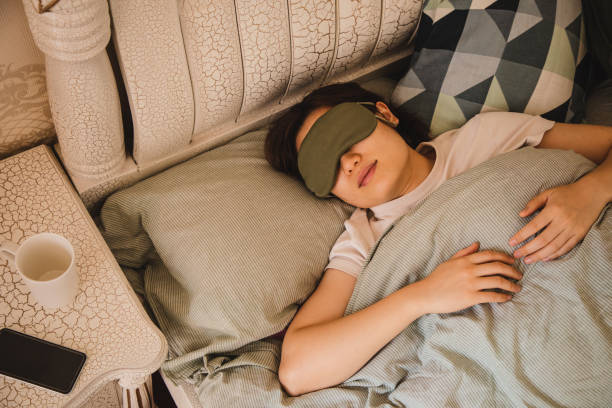Is Mirtazapine Effective For Your Sleeping?

Many individuals overlook the importance of sleep. Getting enough sleep each night can have a direct impact on your mood, cognition, and productivity. However, 70% of US people report getting insufficient sleep at least one night every month.
There are several approaches you may take to try to enhance your sleep cycle. One of them is taking medicine to help you fall and stay asleep faster. Remeron, also known as mirtazapine, is one such medication.
While Remeron is also used as an antidepressant, it has showed some potential in treating sleep disturbances. Let’s take a look at Mirtazapine’s efficacy, as well as its additional applications and negative effects.
Table of Contents
What is Mirtazapine?
Mirtazapine was created by the Dutch pharmaceutical firm Organon and was initially authorized in the Netherlands in 1994 for the treatment of severe depression. It was introduced in the United States under the trade name Remeron in 1996.
Mirtazapine is still marketed as Remeron in most countries, but because it is no longer trademarked, generic copies are available under a variety of brand names worldwide.
Mirtazapine, like many other antidepressants, works by boosting the concentration of particular neurotransmitters (chemical messengers) in the brain, although it does so in a different way than many others on the market. Mirtazapine does not prevent the recycling of these messengers, but rather inhibits certain of the receptors with which they engage.
Mirtazapine appears to be a useful therapy for insomnia in persons suffering from depression. It’s unclear if the medicine itself lessens the symptoms of sleeplessness or whether lessening the intensity of depressed symptoms has the unintended consequence of allowing the individual to sleep better.
Is Mirtazapine Effective For Your Sleeping?
Mirtazapine has been studied as a sleep aid in a few trials on healthy volunteers, and it has been proven to enhance sleep.
One such research kept participants awake with strong road sounds to mimic sleeplessness. The study discovered that low-dose mirtazapine (7mg) significantly enhanced both sleep time and sleep quality in comparison to placebo.
While studying the drug’s effects on healthy volunteers is beneficial, it is probable that the effects will differ between healthy people and those suffering from insomnia.
Mirtazapine has been studied in persons with depression, but just one research has looked at this medicine in patients who are already having sleeplessness but do not have depression.
The researchers studied two groups of people: those who had both sadness and sleeplessness, and those who simply had insomnia. The investigators discovered that low-dose mirtazapine was beneficial for treating insomnia in both groups, regardless of whether the person was also depressed.
While these findings are encouraging, additional research in persons with insomnia is needed to determine whether long-term use of mirtazapine has any negative side effects.
How Does Mirtazapine Help You Sleep?
A number of studies have been undertaken to demonstrate the usefulness of Remeron as a sleep aid.
All participants in one research reported an improvement in their sleep patterns after taking Mirtazapine.
Antidepressants like Mirtazapine operate by increasing the amount of serotonin in your brain. Serotonin is a neurochemical that is important for mood stabilization and feelings of well-being, but it can also aid with sleep.
Mirtazapine contains sedative properties, which means it might shorten the time it takes you to fall asleep. It has also been demonstrated to modestly lower REM sleep and night-time waking, which helps to enhance overall sleep quality. This might be linked to its strong antihistamine effects, which frequently produce sleepiness.
Better sleep is a side effect of all antidepressants that is associated with improved emotions and higher daytime activities.
Having said that, no trials have been conducted to investigate the effectiveness of Mirtazapine in persons suffering from insomnia alone. So far, every clinical research has been done on people who are either depressed or completely healthy. More research is needed to determine whether Mirtazapine can be taken alone to treat sleep disturbances.
Mirtazapine Side Effects
This antidepressant’s side effects are typically moderate, with sleepiness being the most prevalent. This is one of the reasons why some individuals use Mirtazapine to treat sleep issues. Furthermore, melancholy and anxiety are the most common causes of sleeplessness. It is possible that addressing your sadness will help you treat your sleeplessness.
While sleepiness is a typical mirtazapine side effect, it is not the only one. Other side effects of this antidepressant include the following.
- Dizziness/lightheadedness
- Increased appetite/weight gain
- Constipation
- Mouth dryness
Tell your doctor about any other drugs you’re presently taking to avoid major adverse effects.
Dosage of mirtazapine
Mirtazapine is available in dosages of 15mg, 30mg, and 45mg in both conventional tablet and dispersible tablet form. It’s also available as a liquid, with a dosage of 15mg per ml.
Mirtazapine is originally given to treat depression or anxiety at a dosage of 15-30 mg per day, administered at bedtime, for two to four weeks. After this time, the dose may be changed according on how your body reacts to it.
If 45mg mirtazapine is required, it can be administered as a single dose per day or divided into two doses during the day.
Mirtazapine is often taken at a low dose for sleep disorders.

Conclusion
Mirtazapine helps more than merely alleviate the basic symptoms of depression, such as mood swings, anger, despair, and difficulty concentrating. It may also aid in the treatment of sleep disorders such as restlessness, waking too early, insomnia, and, in certain circumstances, excessive drowsiness.
Mirtazapine has been shown in studies to shorten the time it takes to fall asleep as well as the duration of lighter phases of sleep. It may possibly enhance your amount of deep sleep episodes. This medicine may also modestly diminish REM sleep, which might avoid waking up often during the night, increasing overall sleep quality and consistency.
The majority of individuals who benefit from mirtazapine have a depressive illness and suffer from sleeplessness as an unwelcome side effect of their mental health condition. Mirtazapine is still being studied in people who do not have a pre-existing mental health problem such as anxiety or depression. According to certain research, low-dose mirtazapine is the most effective kind of insomnia therapy.


















![Nectar Premier Copper Mattress Review In 2022 [Updated]](https://www.myspacebeds.com/wp-content/uploads/2022/09/Nectar-Premier-Copper-Mattress-Review-In-2022-Updated.jpg)
![Therapedic Mattress Reviews Buy Or Avoid [2022]](https://www.myspacebeds.com/wp-content/uploads/2022/10/Therapedic-Mattress-Reviews-Buy-Or-Avoid-2022-520x293.jpeg)

![Dr. Oz Good Life Mattress Reviews In 2022 [Updated]](https://www.myspacebeds.com/wp-content/uploads/2022/09/Dr.-Oz-Good-Life-Mattress-Reviews-In-2022-Updated-2.jpg)